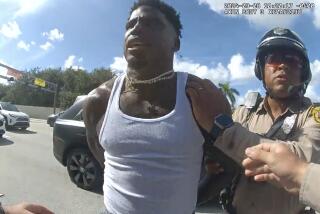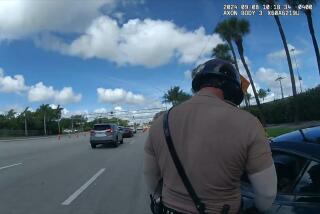King Testifies He Didn’t Threaten, Attack Officers : Police: He was not asked in July grand jury appearance if the beating was racially motivated. Testimony offers preview of civil rights trial.
- Share via
Rodney G. King told federal grand jurors that he never threatened or attacked police officers who beat him on March 3, 1991, but he was never asked whether the beating was racially motivated, an accusation he has previously leveled against the officers.
King told the grand jurors that he tried to run away while he was being arrested, but was struck in the head. “My whole body went numb after the first blow to the head,” he said.
The grand jury heard King’s testimony July 23, 1992, and a transcript of that hearing was obtained by The Times on Wednesday. King’s grand jury appearance was the first and only time he has testified about the beating under oath, and it provides a preview of his expected appearance in the federal civil rights trial of four officers charged in the beating.
King was never called to testify in the state trial of the officers, which ended in acquittals on all but one count.
His grand jury testimony, in which he portrays himself as set upon despite his attempts to comply with orders by several police officers, contrasts sharply with the defense’s portrait of King that evening. In a motion filed this week, defense lawyers said King appeared to be a “PCP-crazed giant” who rebuffed every effort to arrest him without harming him.
The transcript reveals that prosecutors carefully questioned King during his 50-minute appearance before the grand jury, but only gingerly touched on topics that could undermine his credibility. For instance, they led King through a methodical explanation of why he has contradicted himself in some of his previous statements about the beating, laying the groundwork for the moment when that issue is raised during the coming trial.
On March 6, 1991, three days after the beating, King was interviewed by reporters and several law enforcement agencies. He initially denied that he had attempted to flee the police officers and said he had only consumed one beer the day of the beating. Before the grand jury, he gave a different account on both of those issues--saying he did try to flee officers and was intoxicated at the time of the beating.
“If you said something different in those interviews, would it be incorrect as opposed to what you said here today?” prosecutor Barry F. Kowalski asked King during the grand jury hearing.
“Yes, sir,” King responded, adding that he was addled by his injuries when he gave those earlier interviews.
“I just felt horrible,” King said. “I felt beat up and like a crushed can. That’s what I felt like, like a crushed can all over, and my spirits were down, real low.”
Kowalski then asked: “Do you think your memory is better today, now, than it was back there a few days after you were injured?”
“Yes, sir,” King said.
King’s comments regarding whether the officers used racial epithets during the beating also have shifted. During his initial interview in jail he did not mention such remarks, but in a July, 1991, interview with investigators from the district attorney’s office, he said he had heard them.
The grand jurors asked him whether he remembered any comments that the officers made. In his response, King did not accuse the officers of using racial epithets but remembered them taunting him: “They were saying: ‘What’s up? What’s up killer? How you feel now, killer?’ ”
The issue of racial motivation has been vigorously argued in this case, with prosecutors maintaining that they are not required to show racial animus to find the defendants guilty of violating King’s civil rights. Many legal scholars agree, but the defense lawyers argue that the facts of this case may require such a showing. U.S. District Judge John G. Davies has accepted written motions on the subject and is expected to rule in the next several days.
In some previous statements, King has said that he drank only one beer on the evening of the incident, but in his testimony, King admitted that he had drunk “quite a bit.” He also acknowledged that he had attempted to flee when he saw a police car with flashing lights behind him.
“So when a police car pulled up behind you, you’d been speeding, you were intoxicated, and you were on parole, is that right?” Kowalski asked. When King agreed, Kowalski added: “Realizing all of that, how did you feel at that moment?”
“Nervous and scared,” King said. “I was scared of going back to prison, going back to jail.”
Afraid of that prospect, King said, he led police on a chase after Highway Patrol officers attempted to pull him over. Lawyers for the four officers charged in the King beating have alleged that the chase reached speeds of about 100 m.p.h., but King’s lawyer, Milton Grimes, has said that King’s car, a 1988 Hyundai, could not go that fast.
King told the jurors that once he was stopped, he put his hands above the steering wheel so that the police could see he did not have a weapon. He also maintained that he stepped out of the car, as directed, and put his hands on the hood.
Once outside the car, King said, he was ordered to lie spread-eagle on the pavement, face-down. He told the grand jury that he did as he was told.
While he was being handcuffed, King said, the officers hurt his arm, causing him to flinch. Defense lawyers maintain that King’s actions were more aggressive and that he threw off the officers who were attempting to handcuff him.
King said that when he moved, the officers drew back and fired a Taser dart at him. Tasers are designed to immobilize suspects by shocking them with electrical current.
“I tried to tighten up my muscles . . . but I still felt the currents running through my body,” King said. “There was nothing I could do to control it.”
King said that he tried to get up and run after being shocked with a second Taser. The officers charged with violating King’s rights allege that King charged Officer Laurence M. Powell and that Powell swung his baton in self-defense. But King said he was merely trying to get away.
“I was trying to run in between the Hyundai . . . and the police car to run towards the--run towards the hills, the park area,” he said.
“So you were trying to get away from what was going on?” Kowalski asked.
“Yes, from the (electrical) currents,” King said. “It scared me.”
It was at that point, King said, that he was stopped by a blow to the right side of the head.
If true, that could help establish that his beating was legally “unreasonable,” and therefore a possible violation of his civil rights. Under police policy, officers are allowed to strike a suspect who refuses to comply with their orders, but they are not allowed to deliver a blow to the head.
He said the officers continued to harass and mock him even after the beating finished. King said he was having trouble breathing while in the ambulance taking him to the hospital. A sheet had been thrown over his head, King said, and his nose and mouth were full of blood.
But King said that every time he tried to blow the sheet off his face so that he could breathe more easily, the officers who were with him in the ambulance would throw it back over his head.
King said he lapsed into unconsciousness for a while and woke up in a hospital, where several officers were standing over him. One officer asked him whether he remembered what had happened.
“I didn’t say anything,” King testified. “And he said: ‘Well, we played a little ball tonight, and guess who won? We did.’ ”
More to Read
Sign up for Essential California
The most important California stories and recommendations in your inbox every morning.
You may occasionally receive promotional content from the Los Angeles Times.













